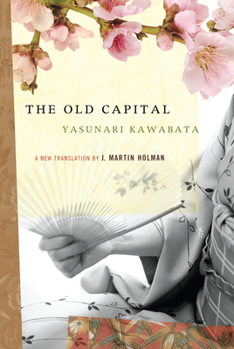The Old Capital
Select Format
Select Condition 
Book Overview
A young woman in historic Kyoto grapples with secrets from her past in this lyrical work of Japanese literature from a Nobel Prize-winning author. The Old Capital is one of the three novels cited specifically by the Nobel Committee when they awarded Yasunari Kawabata the Nobel Prize for Literature in 1968. With the ethereal tone and aesthetic styling characteristic of Kawabata's prose, The Old Capital tells the story of...
Format:Paperback
Language:English
ISBN:1593760329
ISBN13:9781593760328
Release Date:January 2006
Publisher:Counterpoint LLC
Length:200 Pages
Weight:0.57 lbs.
Dimensions:0.5" x 5.5" x 8.1"
Related Subjects
Contemporary Fiction Genre Fiction Historical Literary Literature & Fiction World LiteratureCustomer Reviews
5 ratings
An Exquisite Novel
Published by Thriftbooks.com User , 18 years ago
The Old Capital, though mentioned along with Snow Country and A Thousand Cranes in the announcement of Kawabata's Nobel Prize in literature, is not as well-known as either of the other two. Yet it is my favorite of his novels. Kawabata explores the distances between people, the differences between them, the value of tradition, and the difficulties of knowing in his narration of Chieko's discovery of her twin sister, from whom she was separated shortly after birth by a kidnapping - or was it by an abandonment? I neither speak nor read Japanese, but J. Martin Holman's translation must be a good one. Virtually every page held me entranced with its beauty.
The Old Capital
Published by Thriftbooks.com User , 20 years ago
If you read for plot, this book isn't for you. The fairly dramatic plot (twins separated at birth by a kidnapping)seems almost an aside to the poetic, carefully crafted descriptions of Kyoto life- lanterns, fire flies, cherry blossoms, kimonos. This book will bring you into a world of the perfect beauty and harmony epitomized in Japanese culture and design. The sadness, confusion and longing experienced by the charaters is made particularly poignant by this backdrop of aesthetic perfection and order. Your focus will be on the beauty of the book's descriptions, but it is somehow these descriptions which leave you saturated with the emotions experienced by the characters.
wonderful... just wonderful...
Published by Thriftbooks.com User , 20 years ago
This is my favorite Kawabata book and I've read quite a few. I think it is much better than more famous "Snow Country". It is also much more complex than other Kawabata books, which are somewhat similar in their repetitive descriptions of the relationship between weak man and unhappy woman. This book is mysterious, eerie, awe-inspiring, beautiful, touchingly tender and somewhat weird. At the center of the story are two female twins, their incomprehensible inner universes and strange sensibilities. "Old Capital" is Kyoto - ancient center of Japan and cradle of the beautiful Heian culture. The city is portrayed as a place where past is mixed with present and aestetic sensibilities is combined with everyday routine of protagonists, who are but simple people with their life centered around family, work and small bussinesses. Reading this book in both Russian and English translations made me realize that a lot of meanings in the book are lost when it is translated in English, because of the complex system of dialogues where the manner of speech is changed accordingly to the status of people conversing and their relationship to each other. Russian, being a much more hierarhical and polite language than English, produces better translation, but than again - as I dont know Japanese, I cant really say how much inferior the translation is compared to the original work.
a departure, but still beautiful
Published by Thriftbooks.com User , 26 years ago
rather than the usual study of twisted eroticism and revenge, this story is amazingly calm, gentle but still wonderfully crafted. the emotions of muted longing and subtle sadness match perfectly with the descriptions of kyoto. well worth a read for kawabata fans.
Exquisite elegy on the passing of Kyoto's traditions.
Published by Thriftbooks.com User , 28 years ago
For years I'd been anxiously awaiting another Kawabata novel to appear in translation. When I finally got a copy of "The Old Capital" I was initially disappointed because Seidenstecker wasn't the translator, but, if anything, I like Holman's style of translation better. Cheiko, the novel's twenty-year-old heroine, embodies Kawabata's ideals of deep sensitivity, beauty, modesty, and virginal purity. She works in her parents' wholesale silk goods store, which is failing like so many traditional Kyoto shops because the Japanese are falling under the spell of Western cultural values. This is especially significant because Kyoto is the cultural center of Japan--the most ancient and traditional of her cities. The successful stores now carry Sony radios and other nontraditional items to satisfy new Western tastes. "Anything for a buck," quips the successful store owner's son. A foundling raised by loving middle-class parents, Cheiko might seem to be on a kind of spiritual quest to find her lost background--rather, the book itself is on a quest to help her find her origins, for she unconsciously unravels the mystery without really trying. Of all Kawabata's novels, this one most resembles "The Sound of the Mountain" in its exquisite evocation of beauty, sensitivity, and the invasion of Western values--but without the heartbreak attached. It's one of the few Kawabata novels that doesn't end in some tragedy or disappointment. Kawabata suffuses the story in a gentle patina of longing. His subtle humor softens any edges, as in the parents' comic insistence that they stole her as a baby when, in reality, she had been left in front of her father's shop. Cheiko doesn't know what to make of this, but she accepts it because she knows her parents love her. According to the introduction, more translations of Kawabata novels are in the works. We can only be grateful. In the meantime, if you've read all his novels and stories in translation, you can either reread your favorites or learn Japanese!





